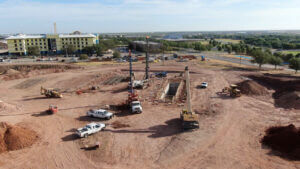
In yet another significant step toward the goal of building a molten salt research reactor, Abilene Christian University’s Nuclear Energy eXperimental Testing Lab submitted an application for a construction permit with the U.S. Nuclear Regulatory Commission on Monday. The application is the first for a new research reactor in more than 30 years and the first-ever for an advanced university research reactor.
“This is a major milestone in preparing for the first-ever advanced university research reactor,” said Dr. Rusty Towell, director of NEXT Lab and professor in the Department of Engineering and Physics. “We’ve been working with the NRC for the past two years as part of the pre-application engagement. Our meetings to this point have been incredibly positive.”
ACU is leading the NEXT Research Alliance, which includes Georgia Institute of Technology, Texas A&M University and The University of Texas at Austin, in a $30.5 million research agreement sponsored by Natura Resources to design and build a university-based advanced molten salt research reactor.
“The forward progress on this project presents incredible opportunities for ACU, NEXTRA and the investors of Natura Resources,” said Doug Robison, founder of Natura Resources.
After receipt of the construction permit application, the NRC will conduct a thorough acceptance review to ensure the application is complete. When the application is formally docketed, the NRC will develop a review schedule and begin the formal technical review.
“If the NRC is able to approve this application within a year, NEXTRA should be well positioned to complete the Natura Resources-sponsored research reactor by 2025,” Towell said.
The construction permit application is one of eight primary milestones NEXT Lab has outlined along the way to making the MSRR operational. The first milestone was completed last year when the Science and Engineering Research Center design was completed. Its completion next summer will mark another milestone. Formal interactions with the NRC make up half of the milestones with the submission and approval of both the construction permit and later the operation license. The final two milestones are the construction of the reactor and it becoming operational. Towell is optimistic that with the support of Natura Resources and NEXTRA, the final milestone is achievable.
“The submission of this application is another step closer toward reaching the goals of NEXT Lab – to provide global solutions to the world’s need for energy, water and medical isotopes,” said Dr. Phil Schubert, ACU president. “In addition, NEXT Lab and the work on the MSRR continue to offer incredible hands-on research opportunities for our students in nuclear science, engineering, chemistry and other majors.”
Learn more about the Department of Engineering and Physics and NEXT Lab.
— Wendy Kilmer
Aug. 17, 2022
